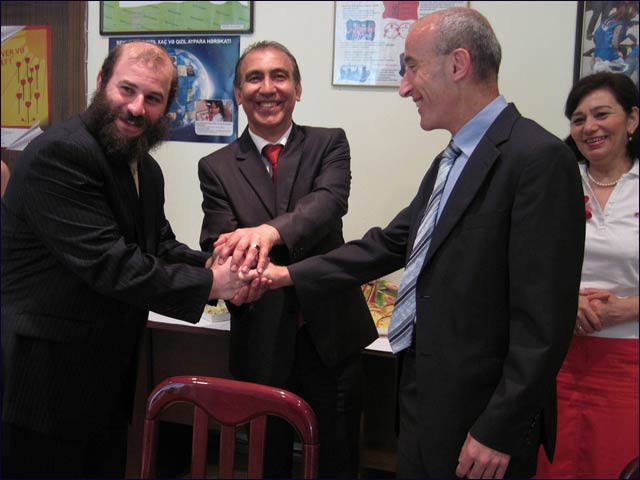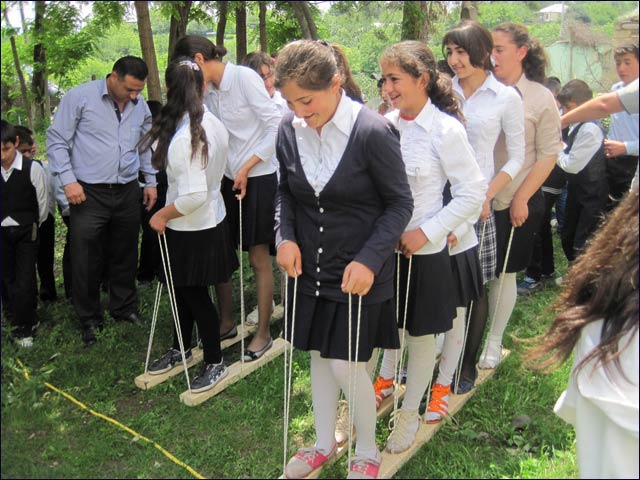By Sarah Carnvek
British Rabbi Yossi Ives is using expertise from Magen David Adom (MADA, Israel’s national emergency response network) to help the Myanmar Ministry of Health upgrade its emergency medical services. Rabbi Ives is also teaching Kenyans how to create a bio-fuel system based on Israeli innovations.
His pulpit may be in the UK, but Rabbi Ives has made it his mission to help the developing world with Israeli know-how.
"The expertise Israel has created is particularly relevant to the countries we want to help," he says. "Israel has a uniquely high concentration of expertise in so many different fields. It is the natural place to come to, to be able to draw innovative solutions."
Ives set up the Tag Foundation for Social Development three years ago as his way of putting Jewish humanitarian values into practice. It's UK-based, but it is centered on Israeli expertise. Tag is an acronym for the Hebrew words "Torah (the first five books of the Bible) and Gedulah (greatness) ".

From left, Rabbi Yossi Ives, founder and chairman of Tag International Development, Vice President Gafar Asgarzade of the Azerbaijan Red Crescent Society and then-Israeli Ambassador Michael Lotem. The international NGO operates more than 20 projects in 12 countries in South Asia, East Africa, the Middle East and the former Soviet Union, focusing primarily on health, agriculture, disaster preparedness and community development.
"We strongly believe that the experience that Israel has gained over the past six decades, as it faced and overcame numerous challenges, as well as its responses to the volatile situation it continues to address, can be immensely helpful to the developing and transitional world. An added benefit is the potential to change attitudes toward Israel and build bridges," reads the organization’s mission statement.
Working together
Ives and his Tag team identify development needs around the globe and assist in setting up programs with partners that have included MADA, MASHAV (Israel’s international aid agency), Israeli universities and local experts to improve health, first aid, water technology and education, among many other initiatives.
"There are hundreds of organizations in Israel contributing to fellow citizens. We export this spirit for volunteerism," says Ives. "The culture of Israel is to help one another. That's a wonderful sentiment."
Current projects include rejuvenating a sustainable local industry in Myanmar through beekeeping. Tag sent two Israeli beekeeping experts to Myanmar to jumpstart the industry in cooperation with the Myanmar Ministry of Livestock and Fisheries.
The experts brought a gift of 70 queen bees from Israel and provided a course in modern beekeeping methods. The trip has set the stage for continued collaboration in agricultural development.
Tag is also working with the Myanmar Ministry of Health to provide expertise in emergency medical services geared to victims of the country’s numerous traffic accidents.
In a project at Ben-Gurion University of the Negev, Tag brought together representatives of the Jordanian Red Crescent (Jordan's counterpart to the Red Cross), MADA and the Negev Institute for Strategies of Peace and Development to provide a seminar on health and leadership development for 14 Bedouin women in Israel.
And in Azerbaijan, the Tag team has been teaching first aid, community building and special outdoor training to the local population affected by sniper fire and landmines.
Sharing, not fixing
Tag's premise is often likened to the Jewish principle of tikkun olam, or repairing the world. However, Ives doesn’t like that analogy.
"I don't see the world as broken and we needing to fix it. We can share. I can't give you what I don't have. I can share what I have," says Ives. "We can only give what we have and we're pleased to share it. Israel can share its knowledge."
Ives says that the people with whom Tag has worked hold Israel in the highest esteem.
"People have fantastical ideas about Israel. There's tremendous respect of Israeli expertise," he says. "Israel gives people hope – if Israel can do it, why can't they? We have twice as many friends as enemies."

The young girls are enjoying outdoor training, which has the serious purpose of keeping them safe from landmines. Most of Tag's core staff is based in Israel, including Chief Operations Officer Dr. Amos Avgar, past executive director of the international development program at the American Jewish Joint Distribution Committee.
"Our operation staff is based here because we are an organization whose focus is on sharing expertise -- almost entirely Israeli expertise," says Ives.
As a British organization, Tag has been able to make global connections regardless of politics. But Ives has a dream that one day, "the world will recognize for non-political reasons that Israel should be the natural destination to come to for solving the world's problems."